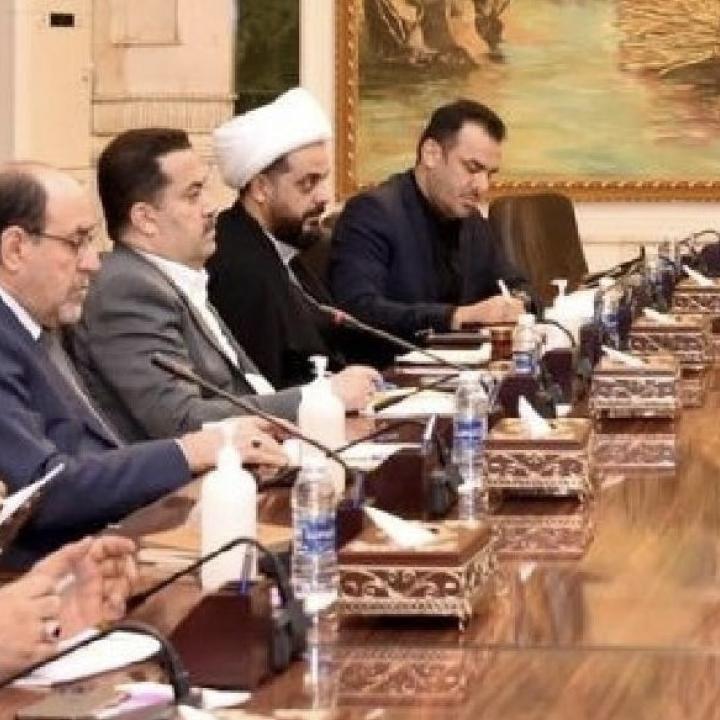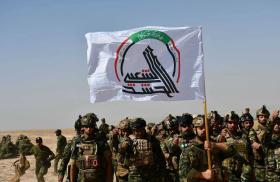
Militia Spokesmen Reflect on Sudani Inviting U.S. Forces to Remain

Asaib Ahl al-Haq is signaling pragmatism, while Kataib Hezbollah is contorting its arguments to allow it to play along, albeit without explicitly accepting a U.S. military presence.
On January 13, Prime Minister Mohammed Shia al-Sudani told the German broadcaster DW that “the general orientation of the government, [which] is supported by the political forces, [is to] determine the missions, the numbers, and places [of U.S. troops in Iraq] and for a specific period of time.” He reiterated this position in an interview with the Wall Street Journal. When mentioning “political forces,” Sudani was referring to the Coordination Framework (CF), the Iran-backed political coalition that includes the powerful muqawama (resistance) militia Asaib Ahl al-Haq (AAH) as a top member. Indeed, on November 20, AAH leader Qais al-Khazali demonstrated his political seniority by publicly referring to Sudani as the "general manager" of the government.
Sudani’s January 13 comments appear to have the CF's backing, perhaps reflecting the fact that AAH has been the framework's most vocal adherent of establishing pragmatic relations with the United States. Notably, Khazali sought to lobby Washington via Iraqi politicians multiple times beginning in 2018—though not since he was listed as a Specially Designated Global Terrorist under U.S. Executive Order 13224, effective January 3, 2020.
Elsewhere, AAH member and current minister of higher education Naim al-Aboudi attended a conference on development and e-system engineering at the American University of Iraq-Baghdad on January 10. There, he delivered a speech and was taken on a tour around campus (Figure 1). A former parliamentarian, Aboudi obtained his PhD in Arabic language studies from the Islamic University of Lebanon, an institution that his own ministry does not legally recognize.
The same day as Aboudi's campus visit, parliamentarian and veteran AAH fighter Ali Turki told the Lebanese daily al-Akhbar, ‘’There is no problem to sit [negotiating] with the U.S. to exchange interests...The U.S. forces are in Iraq today to train Iraqi security forces…We are trying to make the relationship with the United States based on partnership and interests’’ (Figure 2). In the same interview, Turki characterized today’s Iraqi government as a "muqawama government."
Although AAH was the first U.S.-designated terrorist movement to fully engage with Iraq's parliamentary politics, there is one other such organization in the CF: Kataib Hezbollah (KH), which is represented by Harakat Hoquq's six seats. On January 13, Hoquq secretary-general Said al-Saray told the Iraqi website Shafaq News, "The failure of Prime Minister Mohammed Shia al-Sudani to implement the decision to expel the American forces...will push us to take political positions. Therefore, this decision must be implemented in accordance with the legal and diplomatic frameworks." Saray was referring to parliament's January 2020 resolution calling on the government to expel foreign troops.
These contradictory positions could be part of the muqawama's emerging division of labor for dealing with the U.S. presence in Iraq. Former Hoquq spokesman Ali Fadlallah appears to have been used to express KH’s views on the tricky issue of being inside a political coalition that is signaling U.S. forces can stay in Iraq, at least for now. On January 16, he explained the issue while discussing U.S.-Iraqi relations on al-Nujaba TV (the media wing of the muqawama group Harakat al-Nujaba): “I see a great maturity in [the way] leaders of the CF and muqawama [behave], and it seems there is coordination on the vision [regarding the United States]. The axis [of resistance] pushes to expel the U.S. forces, and the Iraqi government tries to negotiate [with the Americans]. But when the negotiations happen under huge pressure, you can weaken the other side...and achieve more benefits in the current period...The muqawama axis is not out of line with the CF’s vision. It seems there is [a policy] of carrot and stick [in dealing] with the American side” (Figure 3). Whether this is the actual muqawama objective—near-term U.S. withdrawal—or merely a fig leaf to excuse KH’s discomfort with the CF position may become clearer in time.






